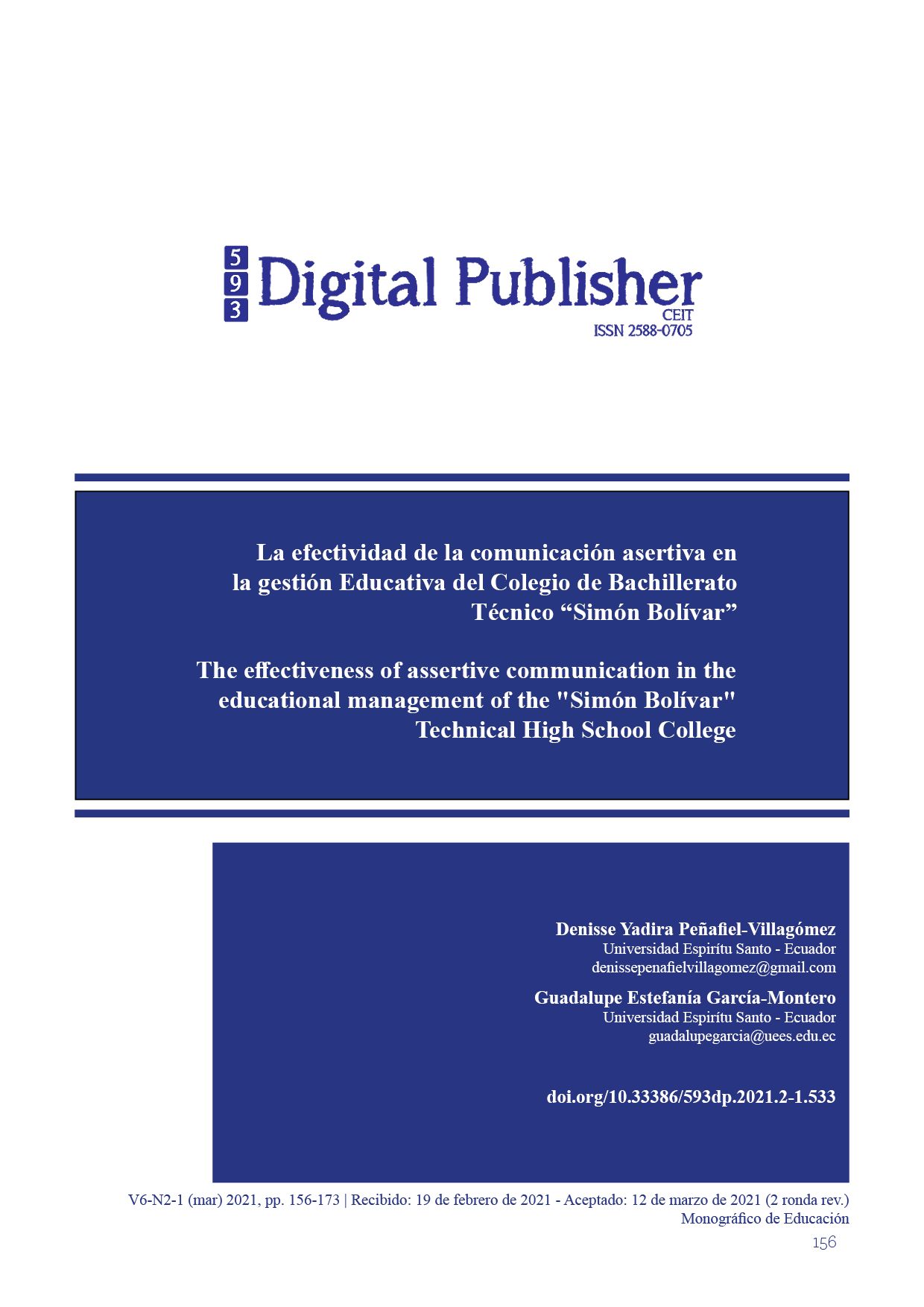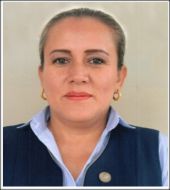The effectiveness of assertive communication in the educational management of the "Simón Bolívar" Technical High School College
Main Article Content
Abstract
The scientific article entitled the effectiveness of assertive communication in the educational management of the "Simón Bolívar" Technical Fiscal College of High School, has the general objective of creating assertive communication strategies for effective management within educational management in the aforementioned institution, and as specifics establish their importance, characterize the techniques; at the same time, define the principles, relate the skills in this communication style and validate the achievement indicators to achieve its effectiveness. The theoretical bases are based on the authors: Lesme et al (2020); Solórzano (2018); Isea et al (2017); Ugalde (2016); Castro et al (2015); among others, who founded the assertive communication and educational management. The type of research is qualitative, it is based on scientific methods: historical - logical, theoretical systematization, analysis and synthesis. As empirical methods: scientific observation, interview, ethnographic record and expert judgment. According to the results, according to the authors, it can be affirmed that, by handling communication assertively, regardless of its form, it can be positively used and used to improve the educational work environment and even its administrative organization and is based on self-esteem , trust, empathy and active listening; which are closely related to each other. Due to the relevance it represents, it is recommended that it be implemented in educational institutions that deserve it, since by applying communication strategies an excellent
educational management will be obtained
Downloads
Article Details

This work is licensed under a Creative Commons Attribution-NonCommercial-ShareAlike 4.0 International License.
1. Derechos de autor
Las obras que se publican en 593 Digital Publisher CEIT están sujetas a los siguientes términos:
1.1. 593 Digital Publisher CEIT, conserva los derechos patrimoniales (copyright) de las obras publicadas, favorece y permite la reutilización de las mismas bajo la licencia Licencia Creative Commons 4.0 de Reconocimiento-NoComercial-CompartirIgual 4.0, por lo cual se pueden copiar, usar, difundir, transmitir y exponer públicamente, siempre que:
1.1.a. Se cite la autoría y fuente original de su publicación (revista, editorial, URL).
1.1.b. No se usen para fines comerciales u onerosos.
1.1.c. Se mencione la existencia y especificaciones de esta licencia de uso.
References
Álvarez, J., Torres, A., & Chaparro, E. (2016). Diagnóstico del liderazgo educativo en las Instituciones de Educación Superior del Valle de Toluca. Revista de Investigación Educativa, 34(1), 51-68.
Asanza, N. (24 de 12 de 2019). La Comunicación Asertiva y su Incidencia en la Gestión Educativa. Ciencia y Educación, 1(3), 20-31.
Caridad, M., Cardeño, N., Cardeño, E., & Castellano, M. (2017). Contribuciones de la comunicación asertiva en la resolución de conflictos dentro de instituciones de educación superior. Espacios, 38(50), 6.
Castanyer, O. (2013). La Asertividad: Expresión de una Sana Autoestima. Madrid: Desclee de Brouwer.
Castro, E., Mineira, F., & Lovera, M. (2015). Conflicto y Comunicación Informal en las Organizaciones Educativas. Omnio, 21(3), 90.
Chandler, A. D. (2003). Strategy and structure: Chapters in the history of the American industrial enterprise.
Cobra, M. (2009). Administração de marketing no Brasil. Brazil.
Contreras, E. (2015). El concepto de Estrategia como fundamento de la planeación estratégica.
Pensamiento y Gestión.(35), 152-181.
Firdaus, N., & Ansori, A. (2019). Optimizing Management of Early Childhood Education in Community Empowerment. Journal of Nonformal Education, 1, 89-96.
Fuentes, M. (2019). Liderazgo en Justicia Social, Ingrediente Indispensable para la Gestión Escolar Incluyente. Revista Daena, 14(1), 335-349.
García, C. (2018). Perspectivas del Impacto en el Liderazgo Educativo y la Calidad del siglo
XXI. Revista Daena, 13(2), 24-39.
García, F., Juárez, S., & Salgado, L. (2018). Gestión Escolar y Calidad Educativa. Revista Cubana de Educación, 37(2), 206-216.
Gómez, J., & Fedor , S. (2016). La Comunicación. Salus, 20(3), 5-6.
Ilie, O., & Metea, I. (2015). Empathic And Assertive Communication. Efficient Communication Developments. In International conference KNOWLEDGE-BASED ORGANIZATION, 21(1), 214-217.
Isea, J., Mora, Y., & Gómez , J. (2017). Estilo Gerencial y su Influencia en la Comunicación de Educación Básica. Revista Científica, 6(10), 4.
Lesme, A., Barrientos, E., & Cordero, M. (2020). Comunicación Asertiva ¿Estrategia de Competitividad Empresarial? Revista de Investigación, Administración e Ingeniería, 8(1), 147-153.
Machado, J. (23 de Diciembre de 2015). Las 7 Técnicas que deberías controlar para ser asertivo. Obtenido de Uptitud Digital: www.uptituddigital.com/tecnicas-metodos-para- ser-asertivo/
Martínez, J., Méndez, I., & J., G. (2015). Burnout y Empatía en cuidadores profesionales de personas mayores. European Journal of investigation in Health, 5(3), 325-333.
Medina, R. (2017). La Asertividad como Estilo de Comunicación: ¿Derechos o deberes? Revista Cubana de Tecnología de la Salud, 8(2), 61.
Muñoz, L. (2019). La Gestión basadas en retos: una perspectiva hacia la innovación educativa.
Revista Electrónica Formación y Calidad Educativa., 7(1), 1-12.
Quintana, Y. (Agosto de 2018). Calidad Educativa y Gestión Escolar. Educación y Educadores, 21(2), 259-281.
Raina, R. (Oct. de 2019). Interpersonal Assertive Communication Behavior of Indian Millennials. Indian Journal of Industrial Relations., 55(2), 321-338.
Rodríguez, C., Figueredo, E., Blanco, V., & Campusano, Y. (2019). El Desarrollo de la Comunicación Asertiva en los Estudiantes de la Carrera Licenciatura en Logopedia de la Universidad de Granma, Cuba. Revista Dilemas Contemporáneas: Educación, Politicas y Valores, 7(1), 21-24.
Simón, M., Molero, M., Pérez Fuentes, M., Gázquez, J., Barragán, A., & Martos, Á. (2017).
Análisis de la relación existentente entre el apoyo social percibido, la autoestima global y la autoeficacia general. European Journal of Health Research, 3(2), 137-149.
Solórzano, R. (2018). El Impacto de la Comunicación Asertiva Docente en el Aprendizaje Autodirigido de los Estudiantes. Revista Universidad y Sociedad, 10(1), 187-194.
Torres, F. (1 de 2018). Taller de Habilidades de Comunicación Asertiva para Líderes. Jalisco, México.
Ugalde, M. (2016). El Liderazgo Académico, Comunicación Asertiva y Motivación. Ensayos Pedagógicos, 11(2), 45-61.
Zuin, F., Franca da Cunha, C., Spers, E., Galeano, R., & Correa da Silva, R. (2016). Etapas de la Planificación Estratégica de Marketing y el Ciclo de vida Organizacional. Revista de Investigación Académica, 19(36), 107-116.



